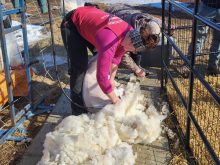A bacteria munching parasite is undergoing tests by Canada’s regulatory bodies to prove its effectiveness against a bacteria responsible for causing hamburger disease.
Known as a bacteriophage, this naturally occurring molecule has passed preliminary tests as an effective weapon against E. coli O157:H7.
The plan is to market an E. coli-specific phage as a feed additive for feedlot cattle before their slaughter, said the chief executive officer of Gangagen Life Sciences Inc., a Canadian company developing the product.
“We have shown the principle is there, that it controls 0:157 in cattle. We are now working on the doses themselves,” said Rainer Engelhardt.
Read Also

Charges laid after cattle theft
Saskatchewan RCMP lay two charges against a man after six cattle went missing.
Probiotics, chelating salts, egg yolk or extra fibre added to the diet have been examined for their ability to reduce bacterial levels in cattle feces, but the phage treatment appears most effective.
Providing phages to dairy cattle is also under study but the initial work started with feedlot beef cattle because of their high level of exposure. Cattle pass this strain of bacteria in their feces and do not suffer ill effects from its presence.
However, if the bacteria get on meat or vegetables or into water, they could cause serious illness in humans.
Slaughter plants take a number of steps to clean manure off hides and carcasses, but a more effective treatment would be to remove the bacteria from the cattle before they enter the plant.
Phages are naturally occurring bacterial parasites that attack specific strains. They do not attack surrounding human or animal cells.
“What we realize now that we didn’t realize in the 1920s is that there are phages that are very specific,” Engelhardt said.
This specific action gives phages an advantage over some antibiotics, which can destroy good and bad gastrointestinal bacteria.
Most recently, Gangagen Life Sciences signed a research, licence and commercialization agreement with Elanco Animal Health to develop and sell antibacterial products derived from bacteriophages. Financial terms were not disclosed. It is the first major pharmaceutical company to support phage technology.
Gangagen Life Sciences was established in 2002 in Ottawa by its American parent, Gangagen Inc., to develop phage-based anti-infective technologies for diseases carried by animals that are transferable to humans.

















